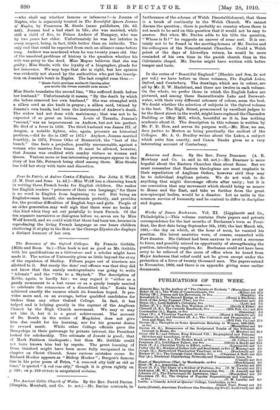The Romance of the Oxford Colleges. By Francis Gribble. (Mills
and Boon. 6s.)—This book is not as good as Mr. Gribble with his qualifications as a litteraieur and a scholar might have made it. The notice of University gives us little beyond the story of the expulsion of Shelley. Fifteen pages out of nineteen are allotted to it. But surely the dons' real offence was that they did not know that this unruly undergraduate was going to write " Adonis " and the " Ode to a Skylark." The description of Keble, again, is hardly fair : we may regard it " either as a gaudy monument to a lost cause or as a gaudy temple erected to celebrate the renascence of a discredited idea." Keble has achieved exactly the success which its founders hoped. It pro- vides more and, on an average, better qualified candidates for Orders than any other Oxford College. In fact, it has helped and is helping greatly in the capture of the Anglican Church by the High Church movement. We may or may not like it, but it is a great achievement. The account of Dr. Routh in the notice of Magdalen does not give him due credit for his learning, nor for his general desire to reward merit. While other College officials gave the Demyships in their patronage by private interest, the President looked for scholarship. The estimate of Jowett is good; that of Mark Pattison inadequate ; but then Mr. Gribble could not have known him but by repute. The great learning of Dean Gaisford might have been more fully recognised in the chapter on Christ Church. Some curious mistakes occur. So Richard Hooker appears as " Bishop Hooker" ; Burgon's famous line in his prize poem of Petra, "A. rose-red city half as old as time," is quoted " A red rose city," though it is given rightly on p. 129 ; on p. 219 virtute is misprinted virtiacte.














































 Previous page
Previous page